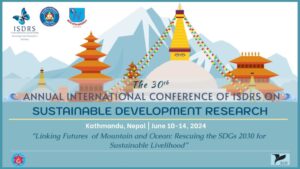
[/quarter][half]
Welcome to Thematic Working Group 3b
Mitigating Climate Change: Renewable Energy and Energy Efficiency
There is now reasonable consensus that climate change, through increased anthropogenic greenhouse gas (GHG) emissions, is one of the most serious threats facing our society, its economy, and the natural environment it depends on (von Borgstede et al., 2013). This consensus is based on observations on climate change effects, such as the increase in the average earth surface temperature, an increase in number of extreme weather events, and melting of polar ices; together with results of climate modelling studies. State-of-the-art research indicates that 50 to 70% reductions in GHG emissions are required up to the year 2050 for the target of limiting the global temperature increase to 2 °C to be met with a probability of more than 66% (Fee et al., 2010). Further reductions will be required after 2050, and the emission levels should peak not later than 2015. While such dramatic change requires strong policy measures to modify energy technologies, across all sectors, it will also require policies that change the behaviour of the public, commerce and industry in relation to energy use. This thematic group addresses renewable energy, as alternative technology options, and energy efficiency, as demand-behaviour interventions, to reduce GHG emissions in the economy and thereby mitigate climate change.
[/half][quarter]
Working Group Chairs
Alan Brent
acb@sun.ac.za
[/quarter]
[three_quarters]
State-of-Art review
Current demographic, economic, social, and technological trends pose major challenges to the long-term sustainability of the global energy system (IEA, 2013). If governments do not implement policies beyond those already planned between now and 2030, it is projected that:
- Energy consumption will increase by over half (53%);
- The energy mix will remain fairly stable and dominated by fossil fuels (80% share);
- Energy-related CO2 emissions will increase by over half (55%); and
- Large populations of the world’s poor will continue to lack access to electricity (about 1.5 billion) and modern cooking and heating services (about 2.5 billion).
The sectoral contributors to growth in energy consumption (and emissions) are expected to be power generation (35%), industry (15%), transport (12%) and buildings (6%) in developing countries, followed by power generation (11%) and transport (6%) in OECD countries (Kaygusuz, 2012). Improving efficiency and reducing carbon dioxide (CO2) emissions should receive early attention in these high growth areas, because these goals are easier and cheaper to attain at the time of new construction than at later retrofit stages (IEA, 2012).
Energy efficiency in end uses is indispensable, accounting for 45% of emission reductions (Kaygusuz, 2012). Other technological contributions could be made by carbon capture and storage (CCS) in power generation and industry (20%), the use of renewables in power generation (10%), and biofuels in transport (6%).

Potential reductions in CO2 emissions by technology area (Source: Kaygusuc, 2012)
Panwar et al. (2013) explore the scope of renewable energy for domestic, industrial and commercial applications. These include solar energy for heating, drying and electricity generation, using solar thermal and photovoltaic systems; wind, ocean (tidal, wave and current); geothermal; hydropower; biomass and waste to energy; and hydrogen – for fuel cell applications.
The transfer and diffusion of clean energy technologies will require a broad portfolio of policy tools. Technology “push” alone is unlikely to deliver the large long-term emission reductions that are needed. Policies for both technology development and “market pull” are required, including price signals through taxes and economic instruments. International collaboration can pool intellectual resources and investment to enhance clean energy deployment. However, domestic policy frameworks are also important for technology deployment and diffusion. Furthermore, from a sustainable development perspective, the local context is critical. If renewable energy technologies are critical to the development of sustainable societies, it is of the utmost importance that government policy-makers and business decision-makers are provided with appropriate assessment tools to enable them to quantify the contribution of renewable energy technologies to sustainability (Brent, 2012).
The emerging field of sustainability science recognizes the role of technology in reaching conditions of sustainable development. Brent (2012) establishes how the principles of sustainability science may manifest in and improve the assessment and subsequent management of renewable energy technologies; by using a case in Africa.
[/three_quarters][quarter]Call for Papers
Next Conference
For more information:
ISDRS 2014
This theme will support the following tracks at the upcoming conference:
Recent articles
Send in articles
Please send in relevant articles to the theme chairs.
Suggested literature
Brent AC, 2012. Technology assessment in developing countries: Sustainable energy systems in the African context. International Journal of Innovation and Technology Management, 9 (5), 1250035 (29 pages).
Fee E, Johansson DJA, Lowe J, Marbaix P, Matthews B, Meinshausen M, 2010.
Scientific Perspectives after Copenhagen—Information Reference Document.
European Union, Brussels, Belgium, available from: http://www.eutrio.be/files/bveu/media/documents/Scientific_Perspectives_After_Copenhagen.pdf (accessed 2014-01-08).
International Energy Agency (IEA), 2013. World Energy Outlook. OECD/IEA, Paris, available from: http://www.worldenergyoutlook.org (accessed 2014-01-08).
International Energy Agency (IEA), 2012. Energy Technology Perspectives 2012 - how to secure a clean energy future. OECD/IEA, Paris, available from: http://www.iea.org/etp/etp2012/ (accessed 2014-01-08).
Kaygusuz K, 2012. Energy for sustainable development: A case of developing countries. Renewable and Sustainable Energy Reviews, 16 (2), 1116-1126.
Panwar NL, Reddy VS, Ranjan KR, Seepana MM, Totlani P, 2013. Sustainable development with renewable energy resources: a review. World Review of Science, Technology and Sustainable Development, 10 (4), 163-184.
von Borgstede C, Andersson M, Johnsson F, 2013. Public attitudes to climate change and carbon mitigation—Implications for energy-associated behaviours. Energy Policy, 57, 182-193.
[/three_quarters]